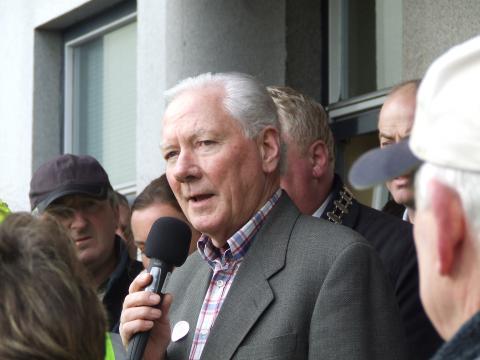Gay would be a good president, but a bad candidate

The presidential race gives candidates a chance to offer a different perspective on how our society might be organised, writes Vincent Browne.
Gay Byrne would be a fine president. Perhaps more than anybody else contemplated now for the presidency, he would represent the values and instincts of the Irish people: decent, conservative, cautious, respectful.
He would grow in the office, learning the tone of the presidency and the protocols. Were he to be declared a candidate, I think he would rate far ahead of all the others in any poll because of the high regard people have for him and the affection he enjoys from the public. That is, initially, he would fare spectacularly in the polls.
As a friend of many years and as someone who gave him encouragement a few months ago to think about running, I am now fearful of what the campaign might do to him and to his sense of contentment.
For I think he would not be a good campaigner. He probably would make gaffes, like any candidate would, but he would not be good at correcting the gaffes. I don’t think he would be good on the hustings, defining what kind of presidency he would offer. There are no skeletons in Gay’s cupboard; in fact he may not have a cupboard, but that is not the point.
In short, Gay probably would be a bad candidate, but very probably a very good president, if fortunate enough to be elected.
The presidency is an odd office. More attention is accorded the presidency in the Constitution than to any other office of State.
Michael Noonan seemed to think in an interview he did with the Limerick Leader a few weeks ago that the position of minister for finance was a major constitutional office, simply because it is mentioned in the Constitution. This is certainly not so (it is not a major constitutional office and the reference to the position in the Constitution is of almost no significance).
Indeed the Constitution accords little attention to the position of taoiseach or chief justice or comptroller and auditor general.
Such attention in the Constitution is accorded to the presidency for it is the foundation stone of the State. It is the president who appoints all the other major offices of the State, including the taoiseach, the members of the government, judges and other senior officers. The president is the commander-in-chief of the Defence Forces.
Yes, all this is ceremonial for such appointments have to be made on the advice of the government, except obviously, the appointment of members of the government itself – the taoiseach is elected by the Dáil, the ministers are nominated by the taoiseach, ratified by the Dáil and then appointed by the president.
Patrick Hillery understood the foundational nature of the office when, reluctantly, he agreed to become president in 1976.
At that time the office was shaken, first by the death of Erskine Childers in 1974, having been elected only the previous year, and then by the resignation of Cearbhall Ó Dálaigh, after less than two years in office. Hillery’s presidency was perhaps the most crucial because it gave stability to the office again and stability is what the office of president is about: stabilising the institutions of the State and the offices of State.
But Mary Robinson showed that the presidency could be somewhat more than that – that the very stature of the office could be used to promote certain values like inclusivity for marginalised groups: immigrants, Travellers, gay people. She also showed the campaign for the presidency could be even more powerful.
She was not the first person to demonstrate the power of a presidential campaign. Tom O’Higgins showed that in 1966, when he campaigned on the platform of a pluralist Ireland with a series of speeches, written mainly by a brilliant young Fine Gael member, Michael Sweetman, who was killed in the Staines air crash of 1972.
That campaign started to change the minds of the Irish people on the nature of this society, which had been viewed as exclusively Catholic and staunchly nationalist.
That campaign, later augmented by the efforts of Conor Cruise O’Brien, Garret FitzGerald and many others, prepared the ground for the historic compromise known as the Belfast Agreement.
The presidential campaign this time around could be used similarly, on some grand project to change minds. Ideally, from my political perspective, it should be used to encourage people to regard the idea of an equal society as the ideal society, to regard the huge disparity now of wealth, income, longevity, educational attainment, health, influence and power as a societal impairment, in the way that people came to regard slavery as abhorrent after millennia during which it was regarded as normal.
Maybe Michael D Higgins will come to articulate ideas akin to that, although his participation in Fine Gael-Labour governments will have raised questions about his seriousness on that score. None of the other candidates on show seems to me to offer any different perspective on how our society might be organised.
Neither would Gay offer a different view, but he would be a president of whom we would be proud.
Image top: Jonathan Ryan.
